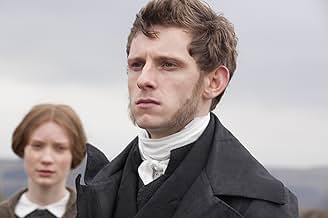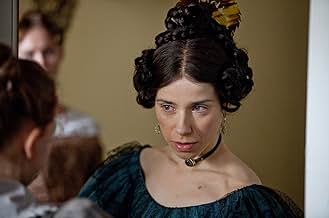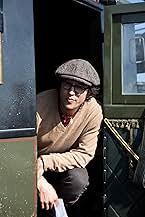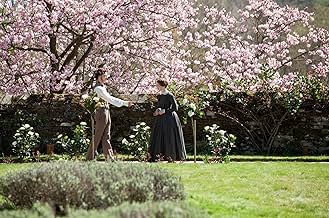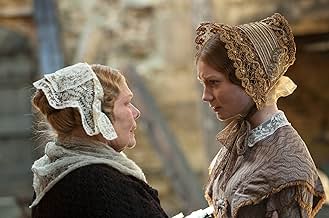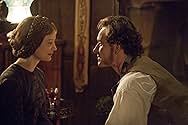Une gouvernante effacée qui adoucit le coeur de son employeur découvre qu'il cache un terrible secret.Une gouvernante effacée qui adoucit le coeur de son employeur découvre qu'il cache un terrible secret.Une gouvernante effacée qui adoucit le coeur de son employeur découvre qu'il cache un terrible secret.
- Director
- Writers
- Stars
- Nommé pour 1 oscar
- 10 victoires et 16 nominations au total
Avis en vedette
Cary Fukunaga brings a haunting cinematic brutal beauty to this Charlotte Brontë classic. The script has been stripped down to the needed scope. Mia Wasikowska has her sense of fragile determination. The acting is impeccable. This is less a costume romance and more a Gothic theater. It is really a painting of mood and deep feeling.
Fukunaga's ("Sin Nombre") take doesn't exactly provide an amazing revelation or epiphanic justification for bringing "Jane Eyre" back to life, but it does prove that no classic can be so overdone that it becomes untouchable; even the most tried and dated of love stories can find new life. Fukanaga has given "Jane Eyre" a photorealistic makeover devoid of frills and fiercely au naturel, but no less gripping than the story's "livelier" retellings.
Fictional period dramas often feel overtly pristine and glazed over to the point of fairytale, but in watching this film, you get the sense that this is quite possibly how the story would have looked and felt if it had been true. All the way down to accents, this rendition has clearly labored over historical authenticity and it shows in the finished product.
Mia Wasikowska ("The Kids Are All Right") continues to choose spot-on independent films despite leading the billion-dollar "Alice in Wonderland" of 2010 and it continues to pay off. She's clearly adept at embodying literary characters, or at least at recreating them within herself rather than worrying about trying to become the way the majority perceives them. Her modest looks suit Jane perfectly and she can play both the fragile girl who has been so often wronged by those who were supposed to care for her and the somewhat self-assured young woman who so plainly understands right from wrong.
Buffini ("Tamara Drewe") tells "Jane Eyre" in an un-narrated flashback. The film opens with Jane dashing away from the spectre of the Thornfield estate and stumbling through the beautifully captured but cold and desolate English countryside in a state of total anguish. She arrives at the Rivers' place where they enquire as to her identity. As the voice of Mr. Rochester (Michael Fassbender) beckons her, she cannot block out the memories of her journey. The film then catches up to that point in real time and continues on to the end.
Other than a terrific performance from Amelia Clarkson as young Jane, the early chapters involving Lowood School seem to be of less significance in this version other than the very clear point to establish Mr. Brocklehurst as an insensitive headmaster and clearly spell out Jane's early traumas that have affected her perspective. The love story between Jane and Mr. Rochester and the way it affects Jane takes supreme precedence in this film and with a two- hour run time, rightfully so. Nevertheless, the short beginnings prevent the film from showing the whole scope of Jane's troubled life.
Fassbender and Wasikowska work terrifically and manage to communicate the class and age discrepancy that made "Jane Eyre" a juicy read back in the 19th Century. Fassbender does seem to let Rochester's guard down quicker than expected, but I enjoyed his choice to be less standoffish and more brooding; he determines his secret to be more a responsibility of an unfortunate nature than a loathsome burden. His love for Jane then feels more sincere.
An actress as magnetizing as Judi Dench choosing to play the caretaker Mrs. Fairfax sums up the humble attitude of this "Jane Eyre." She uses her gravitas to the effect of being the film's lone comic relief and complements the scenes rather than stealing them from Wasikowska, who is 55 years her junior.
The film itself aims for subtlety and chooses not to amp up the shock value of the story's most pivotal scenes. There's some manufactured suspense, but it's mostly natural. It ends up being the most commendable aspect of Fukunaga's vision, but maybe the most hampering as well. He creates exceptional tone and mood with the help of his wonderful cast and this seizes our interest, but his "Jane" never takes a chance with any emotional punches. A superbly crafted film, just not a resonant one.
~Steven C
On the negative side, there never really seemed to be enough interaction between the characters to justify their attachments to one another. I'm speaking specifically of Jane and Rochester, who are portrayed as being totally in love with each other without much of a reason why ever seen by the audience.
That's a small complaint, though, and one that's easily overlooked if you're watching the movie for more than just the romantic aspect, like I was. I've got to admit, Mia Wasikowska was an excellent Jane. She fit into the time and place shown like a hand in a glove, naturally speaking the poetic dialogue. Michael Fassbender continues his inexorable climb to A-list actor status, and Judi Dench (who I didn't even know was in the movie until I saw her on the screen), is a welcome presence, as always. Jane Eyre isn't a perfect movie, but for me, its strengths far outweighed its flaws.
There have been at least 18 film versions of "Jane Eyre" and 9 made-for-television movies--27 in all! I have seen most of them, some multiple times–-both out of my deep love for the tale, and as part of the research for my novel "The Secret Diaries of Charlotte Brontë," the true story of Charlotte's remarkable life, her inspiration behind "Jane Eyre," and her turbulent, real-life romance.
Every screen version of JANE EYRE has its merits. I especially loved Timothy Dalton's portrayal of Mr. Rochester in the 1983 mini-series, and the 2006 Masterpiece Theatre mini-series starring Ruth Wilson and Toby Stephens. I was very curious to see how the new JANE EYRE adaptation from Focus Films would measure up. I am happy to report that the film, which I saw last night at an advance screening, is very good indeed, with marvelous visuals, terrific performances, and enough unique elements to make it a worthy new addition.
The most notable distinction that sets this film apart from the rest is its structure. Rather than telling the tale in a linear fashion, it begins at a crisis moment later in the story, and tells the majority of the tale in flashback–-which works wonderfully well, enabling screenwriter Moira Buffini to effectively compress a long novel into a two-hour time span.
The movie opens as Jane is fleeing Thornfield after having discovered Mr. Rochester's dark and heartbreaking secret. We fear for her as she becomes lost on the stormy moor. The mystery continues as St. John Rivers (well-played by a sympathetic yet appropriately stern Jamie Bell) and his sisters take her in. As Jane ruminates about the past events that led to her escape, we are treated to the story in flashback.
The casting of Mia Wasikowska as Jane Eyre also sets this production apart, since she is closer in age than most actresses who've played the role to the character in the novel, who was about 18 years old in the Thornfield section. Although I wish Mia's Jane was a bit more "swoony" over Mr. Rochester earlier on (yes, she is supposed to be stoic, but I missed that phase where we get to see her blossom as she falls in love with him, and then is utterly crushed when she believes him to be in love with Miss Ingram), Mia truly inhabits the role, beautifully portraying Jane's sense of self-respect, integrity, and restraint, as well as her passion and vulnerability.
Michael Fassbender embodies Mr. Rochester with the ideal blend of charisma and sinister brooding, while at the same time allowing glimpses of his underlying desperation and the wounded depths of his soul. Sally Hawkins as Mrs. Reed effectively portrays the icy ogre who menaces the young Jane (a spirited and appealing Amelia Clarkson.) And Judi Dench, as always, gives a superb performance as housekeeper Mrs. Fairfax.
The film's locations do justice to the novel's often gloomy, atmospheric tone. Director Cary Fukunaga makes excellent use of Haddon Hall in Derbyshire, one of the oldest houses in England, as Thornfield Hall, emphasizing its dark, Gothic, masculine feel. The exterior locations--gardens, cliffs, craggy rocks, stone walls, and seemingly endless fields--make an arresting, dramatic backdrop for the story. You truly feel as though you are in the middle of nowhere.
My only minor gripes are that when Mr. Rochester's secret is revealed, it feels a little too prettified, and the ending was too abrupt for me. But that aside, the filmmakers have done a masterful job translating the novel to the screen. I highly recommend it! --Syrie James
Le saviez-vous
- AnecdotesTo help create the gothic atmosphere present in this movie, many shots were lit exclusively by firelight or candlelight.
- GaffesAt one point, Jane tells Adèle to come with her and refers to Adèle as "Madame" rather than the proper form of "Mademoiselle" which is used for a young, unmarried girl.
- Citations
Jane Eyre: I have lived a full life here. I have not been trampled on. I have not been petrified. I have not been excluded from every glimpse of what is bright. I have known you, Mr. Rochester, and it strikes me with anguish to be torn from you.
Rochester: Then why must you leave?
Jane Eyre: Because of your wife.
Rochester: I have no wife.
Jane Eyre: But you are to be married.
Rochester: Jane, you must stay.
Jane Eyre: I'm become nothing to you?...
[near tears]
Jane Eyre: Am I a machine with out feelings? Do you think that because I am poor, plain, obscure, and little that I am souless and heartless? I have as much soul as you and full as much heart. And if God had possessed me with beauty and wealth, I could make it as hard for you to leave me as it is for I to leave you... I'm not speaking to you through mortal flesh. It is my spirit that addresses your spirit, as if we'd have passed through the grave and stood at God's feet equal. As we are.
Rochester: [taking her arms] As we are.
Jane Eyre: [trying to pull away] I am a free human being with an independent will, which I now exert to leave you.
Rochester: Than let you will decide your destiny. I offer you my hand, my heart. Jane, I ask you to pass through life at my side. You are my equal and my likeness... Will you marry me?
Jane Eyre: Are you mocking me?
Rochester: Do you doubt me?
Jane Eyre: Entirely.
- ConnexionsFeatured in Ebert Presents: At the Movies: Episode #1.8 (2011)
- Bandes originalesFlamme Vengeresse
From Act 3 of "Le Domino Noir" (1837)
Music by Daniel-François Auber
Libretto by Eugène Scribe
Performed by Romy Settbon Moore
Arranged by Andrew McKenna
Meilleurs choix
- How long is Jane Eyre?Propulsé par Alexa
Détails
- Date de sortie
- Pays d’origine
- Sites officiels
- Langues
- Aussi connu sous le nom de
- Chuyện Tình Nàng Jane Eyre
- Lieux de tournage
- Haddon Hall, Bakewell, Derbyshire, Angleterre, Royaume-Uni(Thornfield Hall before the fire)
- sociétés de production
- Consultez plus de crédits d'entreprise sur IMDbPro
Box-office
- Brut – États-Unis et Canada
- 11 242 660 $ US
- Fin de semaine d'ouverture – États-Unis et Canada
- 182 885 $ US
- 13 mars 2011
- Brut – à l'échelle mondiale
- 41 537 915 $ US
- Durée2 heures
- Couleur
- Mixage
- Rapport de forme
- 1.85 : 1







